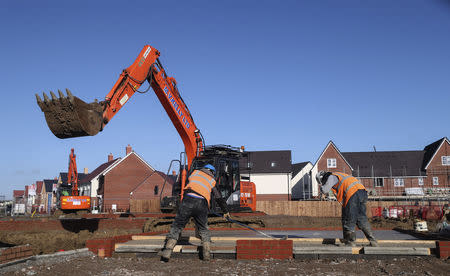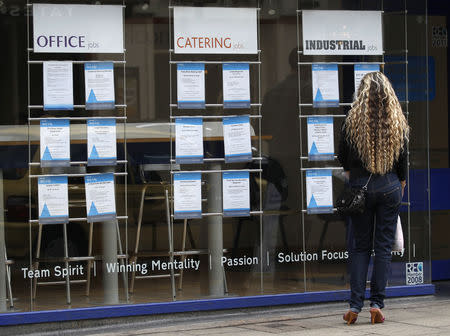UK pay growth fastest since 2008 as firms face staff shortages
By David Milliken and Alistair Smout
LONDON (Reuters) - Average pay in Britain is rising at the fastest rate in nearly a decade, amid a record fall in the number of eastern European workers ahead of Brexit and business complaints about a shortage of qualified staff.
Wages excluding volatile bonuses rose by an annual 3.2 percent in the three months to the end of September, the biggest increase since the final quarter of 2008, figures from the Office for National Statistics showed on Tuesday.
But adjusted for inflation, the gains are less impressive. Pay is still lower in real terms than a decade ago, and the third-quarter rise of 0.9 percent was last higher in late 2016.
Britain's economy has lost momentum since 2016's Brexit vote, and the pick-up in wages has not been matched by improving productivity, without which gains to living standards risk being eroded in future by higher inflation.
Year-on-year growth in output per hour slowed to 0.1 percent in the third quarter from 1.4 percent the quarter before, Tuesday's data showed -- something likely to reinforce Bank of England concerns that faster pay growth will prove inflationary.
"This could set the scene for a BoE rate rise in the coming months, but much will of course depend on the outcome of the Brexit negotiation," Nomura economist George Buckley said.
The BoE raised rates for only the second time since the 2008-09 financial crisis in August. Most economists polled by Reuters think they will increase again within the next six months, assuming Britain leaves the EU smoothly in March.
Britain's labour market has long wrong-footed the central bank. Unemployment has fallen far further than the BoE once thought likely and employers until recently found a ready reserve of workers -- many from eastern Europe -- that kept a lid on pay.
Now there are signs unemployment may have bottomed and the traditional relationship between low unemployment and faster nominal wage growth is reasserting itself.
Last month BoE chief economist Andy Haldane said he saw a "new dawn" for pay growth, and earlier this month the central bank nudged up its forecast for 2018 total wage growth.
However, the BoE does not expect pay growth to return to pre-crisis levels of over 4 percent without a marked pick-up in productivity. So far this seems absent, and Haldane said on Friday that Brexit was distracting government and business efforts to improve it.
JOBLESSNESS EDGES UP
Unemployment unexpectedly rose to 4.1 percent in the three months to September from a 43-year low of 4.0 percent the previous quarter, as slowing job creation failed to keep pace with rising job-seeker numbers.
Britain's economy added 23,000 jobs in the third quarter, a fraction of the 350,000 created over the previous 12 months.
Moreover, in the year to September there was an exodus of workers from the eight eastern European countries which joined the EU in 2004. Their numbers fell by 154,000 to 881,000, a record 15 percent drop that overwhelmed a small rise in workers from elsewhere in the EU.
Britain has said EU citizens already in the country will be free to stay after Brexit but many fear bureaucratic hurdles or see improved prospects in their home countries.
Sectors such as hotels and restaurants, social care, food processing and construction rely especially heavily on EU staff, particularly for lower-paid jobs.
"We already have record numbers of vacancies, and the signs are that these skills shortages will further intensify over the next few months as EU workers no longer find the UK an attractive place to work," said Tom Hadley, policy director at the Recruitment and Employment Confederation trade association.
(Reporting by David Milliken and Alistair Smout; Graphic by Andy Bruce; Editing by Hugh Lawson)

 Yahoo News
Yahoo News 

